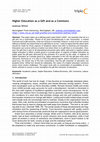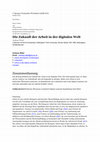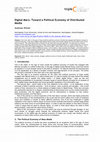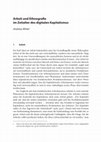Articles by Andreas Wittel
Higher education for good. Teaching and Learning Futures, 2023
This chapter argues that - like art - higher education is a gift, or better, that it can be a gif... more This chapter argues that - like art - higher education is a gift, or better, that it can be a gift, a gift that needs to be fostered. For the gift to emerge, the political-economic context in which higher education operates needs to be explored. It is also necessary to examine teaching pedagogies that provide fertile soil for the gift. The chapter examines the potential of the gift to shine from two angles. The first angle - property regimes or political economies - compares the marketized university with higher education as a common. The second angle focuses on three teaching pedagogies that are particularly important in times of multiple and existential crises: resonance, relevance, and imagination.

The Commoner, 2023
What does it mean to live with the threat of extinction? We make a case that living with the thre... more What does it mean to live with the threat of extinction? We make a case that living with the threat of extinction logically can only mean that we have to abandon the modernist ideology of progress. We review ideas of societal progress and note the decline in arguments relating to progress in the writings of political and social commentators. However, alive and well, and hidden in plain sight, is the current dominant ideology of progress – the central policy goal of governments to achieve growth in Gross Domestic Product. We must abandon this twisted ideology of progress. We point to two interrelated elements of a political economy of after-progress – degrowth and commoning. Currently, there are rich and vital literatures on degrowth and on commoning, but rarely do writers in these fields come into explicit dialogue with each other to see and develop a shared logic. We outline a political economy of degrowth as one centred on sustaining the commons, and contrast this with current arguments for green capitalism, centred on the idea of a Green New Deal. Competitive individualism is the central social relationship of capitalism, and is a social relationship that leads to the destruction of the commons. By contrast, commoning should be seen as the central social relationship of a degrowth economy. It is simultaneously a social relationship and an ecological relationship. It is a social ecological relationship to sustain the commons within a degrowth economy.
Sociology, 2020
One of the most important focuses in social theory within the last decade has been upon the commo... more One of the most important focuses in social theory within the last decade has been upon the commons. We contribute to the emerging scholarship on the commons. We point out that this literature tends to neglect the workplace. We then argue that the workplace should be included as a potentially important arena of commoning. Going to studies of the workplace, we find that scholarship has implicitly found key emergent elements of commoning within the social relations of work. We develop a concept of the workplace commons, and consider arguments that the workplace commons is merely a fix for capitalism.

tripleC, 2018
This paper takes as a starting point Lewis Hyde's (2007, xvi) assertion that art is a gift and no... more This paper takes as a starting point Lewis Hyde's (2007, xvi) assertion that art is a gift and not a commodity: " Works of art exist simultaneously in two 'economies', a market economy and a gift economy. Only one of these is essential, however: a work of art can survive without a market, but where there is no gift there is no art. " I want to argue that the same claim should be made for those aspects of academic labour that refer to teaching and education. Education can survive without a market, but where there is no gift there is no education. However the gift that is part of all educational processes gets rather obscured in regimes where higher education is either a public good or a private good. In regimes of higher education as public good the gift gets obscured by the provision of a service by the state. In regimes of higher education as a private good (e.g. higher education in the UK) the gift gets even more obscured, obviously so. It is only in a third educational regime, where education is a common good (e.g. the recent rise of the free universities), that the gift character of education can properly shine. Whilst this should be celebrated, the notion of a higher education commons poses some severe challenges. The paper ends with an examination of possibilities of academic activists to rescue or even strengthen the gift-like character of education.

in Koch, G. (2017), Digitisation. Routledge.
The political economy of digital technologies is a relatively young field of research which has r... more The political economy of digital technologies is a relatively young field of research which has rapidly grown over the last two decades. I am not aware of an attempt to outline this field in a more systematic way. In fact, it might be debatable whether such an attempt makes much sense in view of the rapid growth of this field and its dynamic transformations and expansions. For this reason, the following reflections are an attempt to provide a provisional appraisal of this field.
What is also debatable is the newness of this field of research. While I am claiming that the political economy of digital technologies (PEDT) is an emerging field, it does not come out of nowhere. It has a predecessor, it is emerging from another field of research, the political economy of media and communication (PEMC). I propose two things: Firstly, that PEDT has
its roots in PEMC, and that it has developed from PEMC. Secondly, that PEDT has developed with a number of significant transformations and expansions. These expansions from PEMC are so profound that it is indeed legitimate to conceptualise PEDT as a new field of study, which focuses on different themes and questions, which uses and produces different theoretical concepts, and which finally embarks on a different understanding of what it means to create scholarly work.
In a process that started decades ago, a multiplicity of forces is creating a slow, but steadily ... more In a process that started decades ago, a multiplicity of forces is creating a slow, but steadily rising storm against anonymity. Discourses of transparency and accountability often describe anonymity as a threat. Technologies such as the IP-address-based Internet, sensory devices, and machine learning techniques further undermine anonymous encounters. In an age of near ubiquitous surveillance, anonymity is under attack. But what is at stake in such discourses and developments? Based on the premise that anonymity is always socially productive and always socially produced, this special issue draws attention to anonymity as a social form that demands renewed attention. The contributions explore its temporalities, its transformative powers, and its entanglements with public spheres, property relations, and practices of person making.

abstract This article starts with the premise that anonymity is under attack and that we are expe... more abstract This article starts with the premise that anonymity is under attack and that we are experiencing the consequences of a slow but steady process of deanonymisation. While we are aware of the ambiguity of anonymity, we want to make an argument in defence of anonymous speech. The social productivity of anonymity will be demonstrated through an analysis of the doxing of Polish blogger Kataryna, whose real life identity was revealed by journalists. Her exposure in 2009 sparked one of the most heated debates in the history of the Polish internet. It triggered a controversy across several newspapers and blogging platforms. Using critical discourse analysis this study investigates how the Kataryna case was constructed, evaluated and interpreted by three traditional daily newspapers and by bloggers on two blogging platforms. The analysis reveals that the debate on online anonymity reflects three underlying conflicts: (1) conflict over the vision of the public sphere, (2) conflict over the professional identities of journalists and bloggers, and (3) conflict over the process of democratisation in Poland.
Teilen und Tauschen, 2017

1 Arbeit und digitale Technologien 2 Lohnarbeit 3 Arbeit in den digital commons Literatur Zusamme... more 1 Arbeit und digitale Technologien 2 Lohnarbeit 3 Arbeit in den digital commons Literatur Zusammenfassung Der Beitrag diskutiert die Zukunft der Arbeit in der digitalen Welt. Der Schwerpunkt liegt vor allem auf der Analyse von Arbeitskraft, also der Kapazität zu arbeiten. Dabei wird Arbeit in zwei politischen Ökonomien analysiert, im Kapitalismus (als Lohnarbeit) und in den digital commons (als entweder unbezahlte oder als indirekt bezahlte Arbeit). SchlüsselwörterPolitische Ökonomie Lohnarbeit Digital commons Kapitalismus Karl Marx Einleitung Arbeit ist eine zentrale Kategorie marxistischer Theoriebildung und ist somit eine zentrale Kategorie sowohl zum Verständnis der sich verschärfenden Krise des Kapitalismus wie auch zur Auslotung möglicher Auswege aus der Krise. Die Kategorie Arbeit hat viele Dimensionen, deren Analyse im Hinblick auf die derzeitige Krise signifikant und relevant sind, so etwa: der diagnostizierte qualitative und quantitative Anstieg von immaterieller Arbeit (Hardt und Negri 2000); neue Formen der Organisation von Arbeit (Castells 1996; Rossiter 2006); neue Formen von Ausbeutung und Selbstausbeutung (Fuchs 2015); neue Formen von Entfremdung und der Taylorisierung von affektiven und intellektuellen Formen von Arbeit (Berardi 2009), die etwa besonders gut im Bereich der Wissensarbeit und der Hochschulbildung zu beobachten sind. Ebenfalls wichtig sind kritische Auseinandersetzungen mit der oftmals proklamierten kreativen Wende der Arbeitswelt (Frank 2013). Die jedoch vielversprechendste Dimension der Kategorie Arbeit liegt in ihrer abstrakten Form, in dem, was Marx mit dem Begriff der Arbeitskraft umschreibt, kurz, in der Möglichkeit zu arbeiten. Es ist dieser Aspekt von Arbeit, der in diesem Kapitel im Vordergrund steht. Um den konzeptionellen Rahmen für eine solche Analyse abzustecken, sei hier auf zwei Dinge hingewiesen. Erstens, wie das auch Marx gemacht hat, müssen Überlegungen zur Zukunft von Arbeit (als Arbeitskraft), im Verhältnis zu Technologien gedacht werden; in diesem Fall sind das die digitalen Informations-und Kommunikationstechnogien.
This is a chapter in my new book, Digital Transitions, 2016, p73-86. This is the pre-published ve... more This is a chapter in my new book, Digital Transitions, 2016, p73-86. This is the pre-published version. For referencing you find the PDF of the published book here:
https://www.academia.edu/22598468/Digital_Transitions

This is an article about digital production and the crisis of capitalism. It is about production ... more This is an article about digital production and the crisis of capitalism. It is about production in the digital commons and its implications for the building of alternatives to a commodified world. As digital production is at the very heart of cognitive capitalism the digital commons is not just any other disruption of the process of commodification. This is the field of a fierce struggle over the future of the internet and the future of capitalism itself. It is potentially the moment which moves back the frontiers of measurement, value and quantification toward qualities, values and an expansion of the gift economy. For this potential to unfold it is vital that those who are giving, sharing, and contributing for the benefit of humanity are supported by global policies that enable them to do so. They have to be supported because their gifts are not based on reciprocity and the obligation to return the gift. This is an argument about the future of digital labour. The article concludes that this could be achieved through a global basic income scheme.

This is the claim: In the age of mass media the political economy of media has engaged with Marxi... more This is the claim: In the age of mass media the political economy of media has engaged with Marxist concepts in a rather limited way. In the age of digital media Marxist theory could and should be applied in a much broader sense to this field of research. The article will provide a rationale for this claim with a two step approach. The first step is to produce evidence for the claim that political economy of mass media engaged with Marxist theory in a rather limited way. It is also to explain the logic behind this limited engagement. The second step – which really is the core objective of this article – is an exploration of key concepts of Marx’s political economy - such as labour, value, property and struggle - and a brief outline of their relevance for a critical analysis of digital media. These concepts are particularly relevant for a deeper understanding of phenomena such as non-market production, peer production, and the digital commons, and for interventions in debates on free culture, intellectual property, and free labour.
This paper explores the possibilities of organising higher education as a commons, beyond the sta... more This paper explores the possibilities of organising higher education as a commons, beyond the state and the market

1 Arbeit Für Karl Marx ist Arbeit bekanntlich einer der Grundbegriff e seiner Philosophie. Arbeit... more 1 Arbeit Für Karl Marx ist Arbeit bekanntlich einer der Grundbegriff e seiner Philosophie. Arbeit ist für ihn nicht nur eine wirtschaft liche, sondern eine menschliche Tätigkeit. Sie ist eine Universalkategorie der menschlichen Existenz und ist als solche unabhängig von spezifi schen sozialen und ökonomischen Formen. "Die Arbeit ist zunächst ein Prozess zwischen Mensch und Natur, ein Prozess, worin der Mensch seinen Stoff wechsel mit der Natur durch seine eigene Tat vermittelt, regelt und kontrolliert" (1985: 192). Im Unterschied zur Arbeit verweist der Arbeitsprozess auf wirtschaft liche und soziale Besonderheiten, auf je spezifi sche Produktionsformen. Transformationen von Arbeitsprozessen sind dann immer auch Transformationen von Gesellschaft en und Ökonomien. Insbesondere unterscheidet Marx kapitalistische von feudalistischen Produktionsformen. Auf diese Weise lässt sich plausibel zeigen, dass der kapitalistische Arbeitsprozess weder notwendig noch unvermeidlich ist und in einer zukünft igen neuen Phase überwunden werden kann. Im Vergleich mit dem feudalistischen Arbeitsprozess arbeitet er zwei zentrale Phänomene des kapitalistischen Arbeitsprozesses heraus: Der Arbeiter arbeitet unter der Kontrolle des Kapitalisten, dem seine Arbeit gehört. "Der Kapitalist paßt auf, daß die Arbeit ordentlich vonstatten geht und die Produktionsmittel zweckmäßig verwandt werden … Zweitens aber: das Produkt ist Eigentum des Kapitalisten, nicht des unmittelbaren Produzenten, des Arbeiters. Der Kapitalist zahlt z. B. den Tageswert der Arbeitskraft " (1985: 199 f.). Damit sind zwei Formen von Entfremdung thematisiert, zum einen die Entfremdung vom Produkt der eigenen Arbeit und die damit einhergehende Unfähigkeit, eben die Dinge, die die Arbeiter selbst produziert haben, für ihren Lebensunterhalt zu verwenden, 1 zum
This article examines the social side of sharing. It is an attempt to work towards a sociological... more This article examines the social side of sharing. It is an attempt to work towards a sociological concept of sharing in the digital age. This is the hypothesis: different forms of sharing have different qualities with respect to the social. Digital technologies bring about new forms of sharing. In order to support this claim I will analyse the social qualities of sharing by focusing on the object, on what is being shared. Using an object-centred analysis it will be argued that digital forms of sharing introduce a new function of sharing. Whereas pre-digital sharing was about exchange, sharing with digital technologies is about exchange and about distribution.

Uploads
Articles by Andreas Wittel
What is also debatable is the newness of this field of research. While I am claiming that the political economy of digital technologies (PEDT) is an emerging field, it does not come out of nowhere. It has a predecessor, it is emerging from another field of research, the political economy of media and communication (PEMC). I propose two things: Firstly, that PEDT has
its roots in PEMC, and that it has developed from PEMC. Secondly, that PEDT has developed with a number of significant transformations and expansions. These expansions from PEMC are so profound that it is indeed legitimate to conceptualise PEDT as a new field of study, which focuses on different themes and questions, which uses and produces different theoretical concepts, and which finally embarks on a different understanding of what it means to create scholarly work.
https://www.academia.edu/22598468/Digital_Transitions
What is also debatable is the newness of this field of research. While I am claiming that the political economy of digital technologies (PEDT) is an emerging field, it does not come out of nowhere. It has a predecessor, it is emerging from another field of research, the political economy of media and communication (PEMC). I propose two things: Firstly, that PEDT has
its roots in PEMC, and that it has developed from PEMC. Secondly, that PEDT has developed with a number of significant transformations and expansions. These expansions from PEMC are so profound that it is indeed legitimate to conceptualise PEDT as a new field of study, which focuses on different themes and questions, which uses and produces different theoretical concepts, and which finally embarks on a different understanding of what it means to create scholarly work.
https://www.academia.edu/22598468/Digital_Transitions
obsolete. The digital economy has become indistinguishable from life in the digital age. This is a book about the merger of economy and life, about life in digital capitalism. It explores four moments of digital transitions: The first chapter explores transitions of sharing, both as a concept or an
ideology and as a social practice. The second chapter explores a transition in the political economy of media and communication and its recent turn to the work of Marx. The third chapter focuses on the building of the digital commons and its very particular economy of contribution. The final
chapter turns the light on academic cultures and inspects the activist turn in academia.
Drawing on recent empirical work with publishers and academics we will explore and critically inspect a number of emergent initiatives. In particular we shall explore contrasting key OA books publication endeavours, which employ varied economic sustainability models (consortial, freemium, grant and author contribution) as well as vectors to openness (pre and post-publication). These will include: Knowledge Unlatched, Open Book Publishers, Open Humanities Press, Cambridge University Press and Liverpool University Press. These will be examined in terms such as quality assurance, economic stability and value authenticity. In this way we shall seek to suggest answers for the question: what is the future for OA book publishing?